- Home
- E. M. Foner
High Priest on Union Station (EarthCent Ambassador Book 3) Page 13
High Priest on Union Station (EarthCent Ambassador Book 3) Read online
Page 13
“Must be a valuable thing,” Joe observed. “Did it come up in the auction?”
“No, which was almost a relief because I never could have won it in open bidding. But the real reason I’m sitting here waiting is that Libby told me you have a Maker staying here, and he’s a historian no less. She said he’ll almost certainly be willing to talk to me when he gets back from Kasil, and if anybody can help me find the Key, it’s him.”
“Other than being old, what makes the Key so valuable?” Joe inquired. When Clive hesitated in his answer, the owner of Mac’s Bones added in his old command voice, “I don’t figure you as a crook, but if you don’t have the money to buy it, what good will it do you to locate the thing?”
“Fair enough,” Clive mumbled to himself before answering. “I figure I can strike a bargain with whoever owns the key because I’m the only one who knows where there’s a lock it will open.”
Joe barked a short laugh and slapped the younger man on the knee. “I guess Keeto didn’t raise any fools. So you know where there’s an old, uh, Effterii ruin with a locked door, and you need to have a look inside.”
“It’s not a ruin,” Clive answered with a sly grin. “The Effterii were integrated with their ships, which were unlike anything we’ve seen. Even the Stryx found their technology puzzling when they first came into contact. But according to Libby, they were doomed by their design, a failsafe put in by their creators that eliminated any desire for independent action. She said the first generation Stryx tried to help the remaining Effterii remake themselves, since their creators were gone. But it wasn’t a flaw that could be corrected, anymore than humans not being telepathic or not having wings is a flaw. Their self-awareness is just of a different order than that of the AI we know. The Effterii can solve complex problems and maintain the technology that was used to create them, but they basically hibernate unless assigned tasks by a captain. And the captain needs a key.”
“So these ships outlived their creators, and then they just shut themselves down?”
“According to Libby, they respond to whoever holds the key, but that made them dangerous, since they contained tremendous knowledge and had limited concerns about its usage. They weren’t exactly slave ships, more like a special case of AI idiot savants, but this predates the tunnel network that the Stryx used to basically impose peace on their portion of the galaxy. The leading empires of the time worried that one of their number could exploit the new knowledge to alter the balance of power, so they made a temporary truce to hunt down the Effterii and destroy them. It wasn’t that difficult since the ships didn’t bother to hide or attempt to protect themselves.”
“But you found one,” Joe stated.
“Beginner’s luck,” Clive admitted cheerfully. “When I took my Caged Bird out on a shakedown cruise, I asked the ship controller for a random jump and almost crashed into a rouge planet. It was just coasting through a nebula, a million light years from anywhere, though it looked like it had been through a bombardment from space. My guess is that it was an outer planet from a system that had an encounter with a stray star or a black hole, and after taking a beating, it got caught in a gravity slingshot and was thrown off into space on its own.”
“And the Effterii ship was parked in orbit?”
“Nope. Since this dark wreck of a world was the first thing I’d ever found all on my own, I went in for a closer look. One of the deep craters showed the presence of a faint energy field, and rather than getting out of there like a smart boy, I risked a landing and hunted down the source. Most beautiful ship I ever saw in my life, just sitting there and gleaming like the day construction was completed. Took me forever to locate the door, seams were microscopic even on the excursion suit viewer, but the keyhole was obvious.”
“Joe?” Kelly called from upstairs. “Are you hiding in the basement drinking beer again? Come on up here, I need you for something.”
“You better beat it out the emergency exit,” Joe told his drinking companion, pointing towards the ramp he used to roll full kegs out of the brew room. “When she sounds like that, it means her feet are tired and she’s looking for masseur.”
“Thanks,” Clive replied with a grin as he stooped to leave through the barrel door. “At least you’re doing it because you want to and not because she’s some Vergallian witch who’s stolen your will with pheromones.”
“She claims foot rubs are in the marriage contract, but I don’t rank high enough to see it,” Joe replied as he headed up the stairs.
Fifteen
Kelly was worried that the all-species ice harvesting conference she had worked so hard to put together was going off the rails. On the final day, a guest speaker took to the podium and began to pontificate, in synchronization with a holographic slide show, on the theme, “What is water?”
“Thank you, Sir Thripaldorp of Pluge,” she cut him off after a new slide contrasting a clear sheet of ice with a pane of window glass appeared. At least, that’s what the subtitles suggested, as both the glass and the ice, if they truly appeared in the hologram, were perfectly invisible. “I’m sure we would all benefit from hearing the rest of your presentation and I’ll be happy to include a video in the post-conference package if you can provide one. However, we really need to move forward with presenting the treaty to limit interstellar ice harvesting before all the water is used up and our descendents suffer a horrible death from dehydration.”
“That was rather dramatic,” whispered Ambassador Bork, who sat next to Kelly at the sponsors table on the stage. “You strike me as rather on edge these last few days.”
“Sorry,” she muttered back. The disappointed lecturer slunk away from the lectern to be replaced by Ambassador Czeros, who was carrying a watering can in one hand. Kelly suppressed a groan and looked away as without a word, the Frunge diplomat began to water his own head. “It’s this stupid symbol of office. If I had known the conference president had to wear a big flat rock as a necklace, I would have let somebody else do it.”
“The rock symbolizes the absence of water,” Bork assured her. “It’s been worn by the presidents of ice treaty conferences for millions of years, as witnessed by the number of marks commemorating treaty signings.”
“It’s crushing my chest,” she complained, then immediately grew embarrassed. Kelly was proud of the close working relationship she maintained with the Drazen ambassador, but he didn’t need to hear about her breasts being sore. “Is Czeros drunk again? He promised me he’d dry out for the conference.”
“He did,” Bork informed her in amusement. “He’s just showing off now. See how there isn’t any water dripping on the floor?”
Kelly gave her full attention to the ambassador’s performance, and realized that the vine-like garden of his hair was capturing all of the water and turning a vibrant green before their eyes.
“Yuck, that’s kind of gross,” she said, without understanding why she should feel that way, since the Frunge descent from trees was no secret. The watering can empty, Czeros flung it aside, bowed, and took his place with the other ambassadors at the end of the Kelly’s table. She glanced at her interactive speakers list and found that the next three presenters had scratched themselves at some point in the last few minutes, almost certainly as a result of her treatment of Sir Windbag from Pluge. Oops, that made it her turn. She rose from her seat and approached the lectern.
“My fellow concerned species,” she began, then paused to shift the heavy slab that hung around her neck and felt like it was preventing her lungs from expanding fully. “I won’t bore you with philosophy or put you to sleep with statistics as we’ve all had enough of that already. The question at hand is one of the long-term survival of biologicals in the sector. Those of us fortunate enough to live on a Stryx station, with their highly efficient water recovery system, would be largely unaffected by the increasing scarcity of harvestable ice in the local space. But those of you who are building new orbitals or trying to terraform lifeless worlds will find that the exp
ense of bringing water from distant volumes of interstellar space will be prohibitive.”
Kelly paused for a moment to catch her breath and wondered why she felt so out of it. Becoming introspective in the middle of public appearances was something new to her, and she speculated that the weight of being a Stryx cred trillionaire was getting under her skin. Yet that very morning she had argued with Joe over calling an InstaSitter for Dorothy while he and Paul made repairs to the Nova. Five creds an hour to babysit an angelic seven-year-old struck her as extortionate. In a better galaxy, she was sure people would be lined up to pay for the privilege of spending quality time with her daughter. In fact, that might be a good idea for a business…
“Stryx to Kelly,” Libby spoke over her implant. “You’re delivering a speech, in case you’ve forgotten.”
“Oh, sorry,” Kelly jerked her head up and wondered how many of the assembled diplomats had noticed her wool gathering. No, don’t think about that, she told herself. Just give the speech.
“While interstellar ice is a slowly renewing resource through supernovae and interstellar winds, the giant factory dipole trawlers deployed by some of the species present are rapidly denuding certain volumes of space of commercially significant supplies,” Kelly read from her heads-up display. “The treaty will limit ice harvesting in any cubic light year of space to one thousandth of one percent of the proven reserves per year. While this limit will undoubtedly prove painful for those who have invested heavily in harvesting infrastructure, this committee believes it is necessary to guarantee the viability of space dwelling for future generations.”
“One thousandth of one percent!” shouted an angry Frunge from the assembly. “At a tenth of a percent we’d have a struggle to make payments on our ships.”
“This committee has proposed as the first amendment to the treaty a provision for extending no-interest loans to equipment owners, and in extreme cases, may authorize buying the equipment for scrap or resale in another sector,” Kelly replied calmly.
“We don’t want to go out of business,” boomed a fast-spoken Verlock in a voice like rolling thunder. “You may as well declare commercial ice harvesting illegal as impose those limits.” A loud chorus of ship owners howled their agreement.
“Friends, fellow species,” Kelly shouted above the clamor, surprising herself with her own passion. “There’s something greater at stake here than your businesses. Interstellar space is the common well from which we all dip, and it’s not right that some take so much more than they need to sell it for wasteful industrial processes and open-cycle commercial space farming. The marks on this heavy stone around my neck witness how many times this treaty has been implemented in the past, only to be gradually forgotten as civilizations rise and fall and hyper-efficient harvesting equipment is reinvented.”
“Who are you to tell us what to do,” cried one of the few human captains from the open admissions gallery. “I’ve raised my family on an ice harvester and they all know how to do an honest day’s work. But you, you could buy out every ice-harvesting outfit here with your pocket change and still have enough left for a beer. Stop messing with our lives and go back to your robot friends.”
“You know what?” Kelly said, wiping the carefully prepared list of talking points off of her heads-up display as the applause for the heckler died down. “I’m beginning to wonder if any of you guys even read the conference package before you registered. The treaty was the first item included, and after the speaker schedule, lunch menus and advertisements from our sponsors, we included another copy of the treaty with non-technical explanations of each and every clause that a ten-year-old could understand.”
“One thousandth of one percent means that at the maximum harvest rate, it would take a hundred thousand years to use up the local ice crystals!” called the same Frunge who had initially interrupted Kelly’s planned remarks.
“So what’s your point?” she asked roughly, giving the alien her toughest stare.
“You humans were still drinking out of your hands a hundred thousand years ago, and you hadn’t figured out how to dig a simple well, much less keep it separate from your outdoor latrines,” the Frunge continued to the obvious enjoyment of his fellows. For the umpteenth time since moving to Union Station, Kelly wished that anthropological documentaries of the up-and-coming species weren’t one of the most popular entertainments on the galactic networks. “You haven’t even been bathing for a hundred thousand years, and you’re trying to tell us about water usage?”
“Do you know why there’s enough water out here for you to keep that sorry patch of weeds you call hair from drying out?” Kelly shouted in response, and poked dramatically at the newest groove on the oversized stone pendant suspended from her sore neck. “Because forty-two thousand years ago, your ancestors signed this very same treaty. And here, ninety-six thousand years ago, they signed the one before that. And here, and here, and here, all the way back to when your forebears were competing with the grasses for dominance on the plains of your home world! Don’t talk to me about a hundred thousand years being a long time. I’ve got two million years right here crushing my nipples!”
The crowd noise was evenly split between angry shouts and laughter as Kelly panted with emotion and tried to catch her breath for the next round. She glanced at the head table to check on her supporters. Czeros was leaning over and concealing his head behind the bulky Verlock ambassador as he drained a hip flask. Bork had a hand over his mouth and his tentacle was wrapped over his eyes, a sure sign of Drazen embarrassment. The Vergallian ambassador favored the EarthCent ambassador with a warm smile, setting off alarm bells in Kelly’s head that she must be making a fool of herself. Aisha materialized at her elbow.
“Ambassador?” Aisha whispered in her ear, leading Kelly to speculate that her intern was checking to see if her superior had been possessed by an evil spirit. “Are you feeling alright? Donna and I were worried that you don’t seem to be yourself.”
Kelly looked out over the crowd to the door of the conference hall, where Donna was fulfilling her usual duties as registrar. Her friend gave an encouraging wave and then placed her hands together like she was saying a prayer, lifted them to her shoulder and tilted her head down towards them. Kelly interpreted the pantomime to mean that the embassy office manager thought the ambassador wasn’t getting enough sleep. Which was true, in part because of all of the cracker crumbs she had created in bed last night after a midnight attempt to settle her stomach, but there was hardly anything she could do about it at the moment.
“I’m fine, Aisha,” Kelly whispered back. “Why don’t you take my seat at the table while I wrap things up, and please try to get Bork to come out of hiding. It’s rather childish, don’t you think?”
“Yes, Ambassador,” Aisha responded, though Kelly wasn’t sure whether she was agreeing about the Drazen ambassador or just acknowledging her instructions. In any case, their brief conversation gave the attendees a chance to calm down again so Kelly could make herself heard without shouting.
“I’m sorry, I really am,” she began again in a conciliatory tone. “It happens that I live in the crew quarters of a scrapped ice harvester myself. But there are more interests represented here than the ice fleet captains, industrial water users and equipment manufacturers. Nobody is accusing you of any wrongdoing, and we all want to implement this treaty with the least amount of economic dislocation possible.”
“But we weren’t even invited to the negotiations,” complained an artificial person with metallic skin who must have been the representative of a manufacturing orbital. “What’s so sacred about one thousandth of one percent? Interstellar winds have changed since the treaty was first written, and our own data suggest that the ice crystal density in local space has actually been rising for the last few years.”
“Thank you for your question,” Kelly answered sincerely, since she had prepared a response for this one. “The terms of the treaty are identical to the terms of similar agreements through
out the galaxy, dating back to the Founding Wars, and they are written to promote political stability as well as to preserve water resources. Such agreements are so fundamental to the coexistence of species that reopening them to negotiation carries far more risk than any possible benefit. I know that’s not an answer you want to hear, but it represents the collective wisdom of sentient creatures stretching back to a time before most of us existed.”
“Well, it sucks,” the artificial person responded, drawing a fresh round of supportive applause. “What you’re telling me is that you held a three-day conference to deliver the bad news. I blew my vacation time on a bunch of presentations about water conservation in manufacturing processes put on by eggheads who have never set foot on an orbital. I could have stayed home on Chintoo and given my fuel cell a rest.”
“The conference package made it clear that the treaty was already ratified,” Kelly repeated. “I’m sorry if you didn’t learn anything of value from our conference, but we really did our best. I personally participated in the selection process for the sessions, and if there had been any presentations submitted from Chintoo or the other local orbitals, I would certainly have given them full consideration. But as it happens, all of the interest in presenting at the educational sessions was from academics and salesmen. I really am sorry.”
Something hot and wet was running down Kelly’s face and she looked up to see if it was dripping from the ceiling. The audience was strangely silent, which was a relief, though she thought her voice had sounded a bit funny at the end there. Probably the weight hanging around her neck taking its toll. She felt an overwhelming urge to sit down on the floor, but as she began to do so, a strong arm circled her waist and prevented her.
“Let’s take a break for a while,” Ambassador Bork suggested soothingly, as he led her back to her seat. Kelly wondered why Aisha wasn’t in her chair, but then she realized the girl was walking on her other side, supporting her by the elbow. “Just let the stone rest on the tabletop, nobody will be offended.”

 Last Night on Union Station (EarthCent Ambassador Book 16)
Last Night on Union Station (EarthCent Ambassador Book 16) Empire Night on Union Station (EarthCent Ambassador Book 18)
Empire Night on Union Station (EarthCent Ambassador Book 18)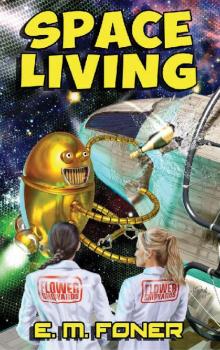 Space Living (EarthCent Universe Book 4)
Space Living (EarthCent Universe Book 4) Review Night on Union Station (EarthCent Ambassador Book 11)
Review Night on Union Station (EarthCent Ambassador Book 11) Assisted Living
Assisted Living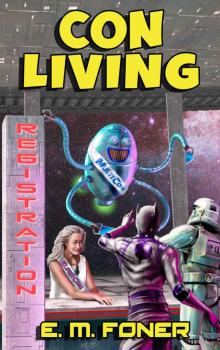 Con Living
Con Living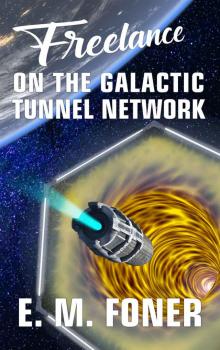 Freelance On The Galactic Tunnel Network
Freelance On The Galactic Tunnel Network Career Night on Union Station
Career Night on Union Station Career Night on Union Station (EarthCent Ambassador Book 15)
Career Night on Union Station (EarthCent Ambassador Book 15) Word Night on Union Station (EarthCent Ambassador Book 9)
Word Night on Union Station (EarthCent Ambassador Book 9) Soup Night on Union Station
Soup Night on Union Station Human Test
Human Test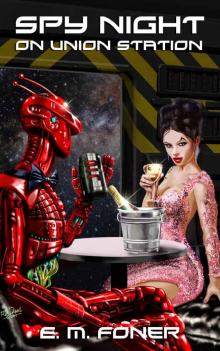 Spy Night on Union Station (EarthCent Ambassador Book 4)
Spy Night on Union Station (EarthCent Ambassador Book 4) Family Night on Union Station (EarthCent Ambassador Book 12)
Family Night on Union Station (EarthCent Ambassador Book 12) Party Night on Union Station (EarthCent Ambassador Book 10)
Party Night on Union Station (EarthCent Ambassador Book 10) Turing Test
Turing Test Alien Night on Union Station (EarthCent Ambassador Book 2)
Alien Night on Union Station (EarthCent Ambassador Book 2) Wanderers On Union Station (EarthCent Ambassador Book 6)
Wanderers On Union Station (EarthCent Ambassador Book 6) Vacation on Union Station (EarthCent Ambassador Book 7)
Vacation on Union Station (EarthCent Ambassador Book 7) Book Night on Union Station (EarthCent Ambassasor 13)
Book Night on Union Station (EarthCent Ambassasor 13) LARP Night on Union Station
LARP Night on Union Station Carnival On Union Station (EarthCent Ambassador Book 5)
Carnival On Union Station (EarthCent Ambassador Book 5) LARP Night on Union Station (EarthCent Ambassador Book 14)
LARP Night on Union Station (EarthCent Ambassador Book 14) Book Night on Union Station
Book Night on Union Station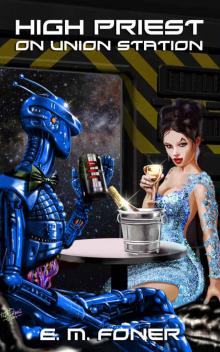 High Priest on Union Station (EarthCent Ambassador Book 3)
High Priest on Union Station (EarthCent Ambassador Book 3) Meghan's Dragon
Meghan's Dragon Human Test (AI Diaries Book 2)
Human Test (AI Diaries Book 2) Guest Night on Union Station
Guest Night on Union Station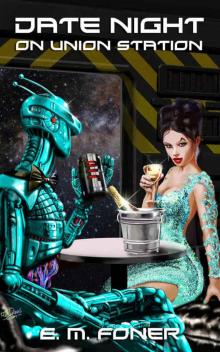 Date Night on Union Station
Date Night on Union Station